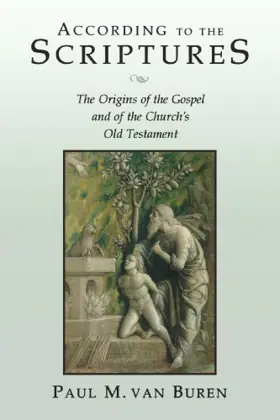

According to the Scriptures: The Origins of the Gospel and of the Church's Old Testament
Pages
158
Publisher
Eerdmans
Published
10/27/1998
ISBN-13
9780802845351
This book calls for a reevaluation of the Old Testament and its role in the Church. It is written out of the conviction that the church needs to claim the Old Testament as its own but also to grant the legitimacy of the Jewish claim on Israel's sacred Scriptures. The author is concerned to debunk several ideas, including the popular notions that Paul was the real inventor of Christianity; that a great gulf exists between the Old Testament and the New Testament; that the early Christians used the Old Testament to prove their already established belief in Jesus; and that Christianity is less credible or valuable if it is seen to depend on Jewish traditions. Van Buren's starting point is an exploration of the meaning and origin of the early Christian confession, "Christ died for our sins in accordance with the scriptures"-particularly the last part of the confession. Van Buren argues that the wording of this early, pre-Pauline gospel confession was the result of a creative application of early Jewish interpretations of scripture, especially of the Binding of Isaac story in Genesis 22. Christians need to affirm the legitimacy of their understanding Christ in light of the Old Testament, argues van Buren, but they also need to grant the legitimacy of the Jewish reading of scripture. The interpretive traditions of both religious communities-Judaism and Christianity-need to be respected. Clearly and elegantly written, this book represents a sensitive ecumenical effort at fostering Jewish-Christian dialogue: a book that both Jews and Christians can read with profit.
Reviews
Van Buren argues passionately for a deepened appreciation of the formative role of the Old Testament in shaping the gospel. He offers the hypothesis that 1 Cor 15: 3-5, a condensation of the Christian story, interpreted the execution of Jesus and subsequent events in light of current Jewish readings of the scriptures. In particular, he maintains that the pre-Pauline gospel resulted from a creative application of early Jewish readings of the aqedah, thereby binding together the faith and identity of the Jewish people and the church–a "remarkable bond . . .[that] puts us in something of a bind, for those Jews who believed Jesus to have been the new Isaac for the whole world parted company from those who did not" (p. 49). Because the "gospel according to the scriptures" decisively formed the composition of the gospel accounts, the historical Jesus is of less importance than the Jesus of the gospels. It was the discovery of the gospel according to the scriptures that animated a new reading of Israel's sacred texts and in turn became the context, foundation, and source of vocabulary for the early church. This reinterpretation of Israel's scriptures became the early church's Bible, which, with the addition of the New Testament (the "early church's copy book," p. 76), then became the church's Old Testament. Israel's Bible became the Bible read with a new interpretation focused on Christ. This christological heremeneutic was not without problems. Within a generation the church seemed to forget that these scriptures were first of all Israel's.
[Full Review]
Once again, Paul van Buren has done a new thing. In his last book he argues that the earliest, pre-Pauline church created its gospel and its Old Testament by a creative interpretation of its scriptures. From this argument, which he claims to be no more than a plausible hypothesis, van Buren draws significant theological implications having to do with the character of relations between Jews and Christians, the standing of the Old Testament in the life of the churches, and the character of God. Van Buren's method is to focus on Paul's "condensed story" of the gospel that he claimed to have "received": "that Christ died for our sins in accordance with the scriptures, that he was buried, that he was raised on the third day in accordance with the scriptures, and that he appeared to Cephas, then to the twelve (I Cor. 15:3-5)." What "according to the scriptures" signifies to van Buren is that the gospel of I Corinthians 15:3-5 "was the result of a creative application to the death of Jesus, and to indescribable occurrences that followed, of particular postbiblical Jewish interpretations of Israel's scriptures" (p. 7). Of chief importance was postbiblical Jewish interpretation of the aqedah, the binding of Isaac. Van Buren denies that the early church formulated its gospel and then took it to the scriptures to find confirmation of it. Just the opposite was the case. The earliest church was doubly disconcerted, by having an executed Messiah and by the disconcerting events that took place "in three days." These "became good news only when the disciples discovered how to interpret them" (p. 21; my emphasis).
[Full Review]
